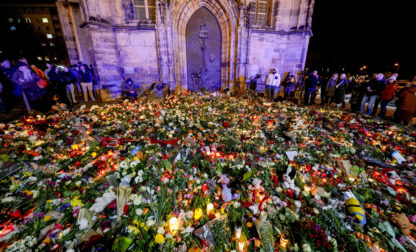HENIN-BEAUMONT, France (AP) — In the former mining town at the heart of French far-right leader Marine Le Pen’s political strategy, her party’s electoral success came as no surprise to hundreds of supporters who gathered to see her victory speech. The same promises to bring back good jobs and upend the political elite that long resonated here have found a national audience. Le Pen implanted herself in the northern town of Henin-Beaumont in the early 2000s. She hoped to win over disenchanted voters feeling left behind by the new economy and growing tired of decades of Socialist local governance. It was the start of a decade-long effort to detoxify her anti-immigration National Rally and win over voters from across French society.
Story Body
HENIN-BEAUMONT, France (AP) — In the former mining town at the heart of French far-right leader Marine Le Pen’s political strategy, her party’s electoral success Sunday came as no surprise to hundreds of supporters who gathered to see her victory speech. The same promises to bring back good jobs and upend the political elite that long resonated here have found a national audience.
Le Pen implanted herself in the northern town of Henin-Beaumont in the early 2000s, hoping to win over disenchanted voters feeling left behind by the new economy and growing tired of decades of Socialist local governance. It was the start of a decade-long effort to detoxify her anti-immigration National Rally and win over voters from across French society.
Several waves of industrial shutdowns have left unemployment levels above the national average, and 60% of the population earns so little it does not need to pay tax, according to data from France’s national statistics agency, INSEE. The construction of a mammoth shopping center on Henin-Beaumont’s outskirts emptied out the town and dozens of shops, hairdressers and restaurants remain empty.
In 2013, the town’s Socialist mayor, Gérard Dalongeville, was sentenced to four years in prison and a 50,000-euro ($53,000) fine for embezzlement of public funds.
“There was a winning cocktail,” including the mayor’s corruption and the closure of industrial plants, said Edouard Mills-Affif, a filmmaker who has done two documentaries on Henin-Beaumont and the rise of its far-right mayor, Steeve Briois.
Le Pen easily won her own race for a parliamentary seat in the first-round voting Sunday — garnering more than 64% of the votes in the town. Since she won more than 50% of the vote, she won’t have to compete in a second round on July 7.
Overall, her National Rally and its allies won a third of the nationwide vote, official results showed, ahead of leftist coalition New Popular Front and President Emmanuel Macron’s centrist party. Sunday’s results provide an overall picture of how each camp fared, but they do not indicate how many seats the groups will get in the end.
Still, for the first time since World War II, a majority in Parliament for a party like Le Pen’s is within reach.
Although France has some of the highest standards of living in the world, lower unemployment than it’s had in decades and a relatively low crime rate compared to its peers, discontent has simmered in some parts in the post-industrial era. But for many National Rally voters, Sunday’s victory is a long-coming revenge on a political class that they see as out of touch with everyday people and their concerns, such as crime, purchasing power and immigration.
“The French have almost wiped out the ‘Macronist’ bloc,” a victorious Le Pen told supporters in Henin-Beaumont. The results, Le Pen added, showed voters’ “willingness to turn the page after seven years of contemptuous and corrosive power.”
Henin-Beaumont is where Le Pen began her efforts to turn her father’s party from political pariah to a voter-friendly alternative — a strategy she then sought to replicate on the national level when she took the reins of the party in 2012.
Her father, Jean-Marie Le Pen, ran a fringe political party, which too often relied on antisemitism and racism to provoke and draw attention, according to Stanford University professor Cecile Alduy.
“Since (Marine) has been at the helm of the party, she has tried to smooth out the rhetoric, embrace a kind of democratic rhetoric,” said Alduy. “Since 2012, it’s been a constant rise, in the ballot box and in the polls.”
Le Pen’s father, now 96, was “a little too extreme” for Magali Quere, born and raised in the town.
“But the National Rally does not scare me,” said Quere, 54, who runs a second-hand furniture shop. “It scared me 30 years ago, but not anymore.”
And it’s not just voters, Alduy said. “Other parties on the right have started to copy her vocabulary or arguments or themes, mainly around immigration and insecurity,” she explained, including Macron and former French President Nicolas Sarkozy.
“It normalizes even more what they (the National Rally) have to offer,” she said.
Briois, Henin-Beaumont’s mayor, was elected in 2014 and reelected for a second term in 2020 with 74% of the votes. He remains a close ally of Marine Le Pen and has been heralded as a model for other National Rally candidates.
A former salesman, his style was a contrast with his predecessors’. He was everywhere. “He associated marketing and advertising techniques with the oldest practices of political action, which is to be at the markets, to go door to door,” said Mills-Affif, the filmmaker who followed him for months on the campaign trail.
Briois encouraged dutiful local residents to inform him of any acts of misconduct or vandalism, taking pictures when they could, that he would then use in his campaigns.
Many residents in Henin-Beaumont say it’s looking better now than it had in a long time. Briois seems to have set aside some of his most extreme projects, such as building a coalition of mayors who are against migrants or a decree he passed to ban begging in the town center that critics said unfairly targeted the Roma population.
Instead, the town renovated the church and the city hall, improved roads, and sent police to regularly patrol the streets, giving locals a sense of security.
Murielle Busine, 57, who described herself as anti-National Rally, praised the work done by Briois. “I will not go as far as voting for them, but I cannot deny everything he has done for the city, and that he is very accessible,” Busine said. “When there’s a problem, he tries to fix it.”
Now there is Jordan Bardella, the party president and Le Pen’s 28-year-old protégé with a huge TikTok following.
“People often say it’s the old people who vote National Rally. Bardella brings the youthful momentum that was missing,” said 22 year-old student Ewan Vandevraye, who attended the event in Henin-Beaumont from Lille, about 30 kilometers (18 miles) away, with three friends.
On Sunday night, supporters were not just shouting “Marine! Marine!” Men, women and youth alike also chanted Bardella’s name.
If the National Rally wins an absolute majority on July 7, Bardella will become France’s youngest-ever prime minister. Le Pen has her eyes on a bigger prize: the presidency in 2027.
___
Associated Press journalist Oleg Cetinic in Paris contributed.






















